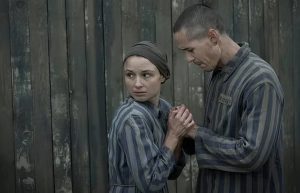The Tattooist of Auschwitz (2024) is a six-part historical drama miniseries based on Heather Morris’s best-selling novel. Directed by Tali Shalom Ezer, the series brings to life the harrowing yet deeply moving true story of Lale Sokolov, a Jewish prisoner in Auschwitz tasked with tattooing identification numbers on fellow inmates. With a stellar cast and a poignant narrative, the series explores themes of love, survival, and humanity amidst unimaginable horrors.
Plot Overview
The story follows Lale Sokolov (Jonah Hauer-King), a Slovakian Jew deported to Auschwitz in 1942. To improve his chances of survival, Lale accepts the role of tattooist, a position that grants him certain privileges but also burdens him with guilt. During his time in the camp, he meets Gita Furmanova (Anna Próchniak), a fellow prisoner, and their love becomes a beacon of hope in the darkest of times. The series chronicles their journey of resilience and courage, highlighting the power of love and the human spirit.
Performances
Jonah Hauer-King delivers a heartfelt performance as Lale, capturing the character’s inner conflict and determination. Anna Próchniak shines as Gita, portraying her strength and vulnerability with grace. The supporting cast, including Harvey Keitel as the older Lale, adds depth and authenticity to the narrative.

Cinematic Elements
The series is visually striking, with cinematography that captures both the bleakness of the concentration camp and the moments of beauty in Lale and Gita’s connection. Hans Zimmer’s haunting score enhances the emotional weight of the story, while the direction by Tali Shalom Ezer ensures a balance between historical accuracy and narrative depth.

Themes and Impact
The Tattooist of Auschwitz delves into themes of love, resilience, and the moral complexities of survival. It offers a deeply personal perspective on the Holocaust, reminding viewers of the enduring power of hope and humanity. The series has been praised for its emotional depth and respectful portrayal of its subject matter.

Flaws
While the series has received critical acclaim, some viewers may find its pacing slow or its focus on the love story overshadowing other aspects of the Holocaust experience. However, these elements are often seen as a deliberate choice to emphasize the personal over the historical.
Conclusion
Overall, The Tattooist of Auschwitz (2024) is a powerful and moving adaptation that honors the legacy of its real-life subjects. With strong performances, evocative visuals, and a deeply emotional narrative, it stands as a testament to the resilience of the human spirit.

